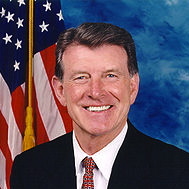Gov. Butch Otter is hinting that his top K-12 priority is restoring budgets to their pre-recession levels — and the Legislature’s two top budget-writers seem to like the idea as well.
But Sen. Dean Cameron and Rep. Maxine Bell, co-chairs of the Joint Finance-Appropriations Committee, want more details about another big-ticket idea from Otter’s education task force: a teacher career ladder.
The task force — 31 education stakeholders, business leaders and elected officials — finished vetting ideas Friday, and agreed on 21 recommendations. The next step is for Otter to sort through the ideas and their costs.

On Tuesday, he told Boise Metro Chamber of Commerce members that he endorsed the task force’s recommendations, but said it will take several years to implement them in full. Restoring K-12 operational funding appears to be step one. “We’ve got to backfill some things,” Otter said, according to the Idaho Statesman’s Dan Popkey. “There were some cuts we made between ’08 and ’10 that were necessary but unfortunate.”
At the Legislature, JFAC would be the starting point in the implementation process. The budget-writing committee would have to find the money to restore operational funding (at a five-year cost of $82.5 million) or launch a career ladder program (costing $253 million over six years). JFAC would also get a first look at ideas to expand broadband and WiFi in schools, or provide teachers and students with individualized technology — ambitious task force proposals that, for now, have no price tag attached to them.
Operational funding — which pays for anything from employee benefits to utilities to transportation — has been cut significantly during the downturn. School districts received $25,696 per classroom in 2008-09, and even after a slight increase, districts are receiving $20,000 per classroom in 2013-14.
While a task force subcommittee report says the districts are in “dire need” of restored operations money, the committee also said the budget could be increased over five years.

“That is probably needed,” said Cameron, R-Rupert.
“I think that’s reasonable,” said Bell, R-Jerome.
The first-year costs of restoring operational money fall comfortably within the existing budget structure. Otter and the 2013 Legislature put $34 million into one-time education programs, hoping to make sure to have money in hand to fund the task force’s recommendations in 2014-15 and beyond.
The career ladder poses more of a challenge. Increasing starting teacher salaries to $40,000 — and phasing in $50,000 to $60,000 salaries for veteran teachers, based on performance — would cost the state at least $40 million each of the next six years. Before joining the rest of the task force in endorsing the plan Friday, Senate Education Committee Chairman John Goedde sounded a cautionary tone. “We have tremendous potential here to bust the bank,” said Goedde, R-Coeur d’Alene.
Cameron says he has supported a career ladder concept for years, and he knows the state can’t afford to get there overnight. And he wonders how a career ladder plan can be phased in over time. “Those are good questions that I don’t have answers for yet.”

Bell, meanwhile, said she is “hesitant” about the career ladder plan. She doesn’t believe the current salary plan is working well, but she also points out that the state isn’t fully funding the current minimum teacher salary of $31,000, leaving districts to pick up the difference. And any K-12 initiative, in teacher salaries or other areas, will have to compete against other pent-up budget demands, from Medicaid to higher education to highway repairs.
House Minority Leader John Rusche also thinks legislators would rather replenish school operations budgets than put money into a teacher career ladder. And that isn’t just because of the higher price of a career ladder plan; Rusche, D-Lewiston, believes some of his colleagues still harbor hard feelings about teachers, after the 2012 Students Come First campaign. Some lawmakers, he said, believe teachers are “in it for the money,” and they will not support a $40,000 minimum teacher salary.

“It just isn’t going to happen.”
Rusche said the task force made a “pretty reasoned statement” for enhanced classroom technology, and the broadband and wireless technology to support it. Rusche was disappointed that the task force was silent on pre-kindergarten programs — but he hopes, given the task force’s push for literacy in the early grades, that the state will at least make it easier for school districts to put money into pre-K, on an optional basis.
